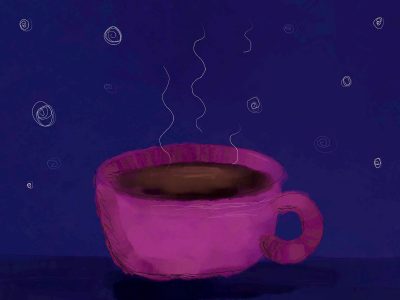As a coffee drinker, I often find myself drinking coffee frequently, especially at the end of a very busy day. Lately, I’ve been needing an extra cup of coffee or an energy drink after dinner to keep up with my overwhelming amount of work. And with the release of the holiday drinks at Dunkin’ and Starbucks, it’s way too easy for me to have coffee all day, every day.

When I first started drinking coffee, I only had it in the morning with breakfast, but as companies release new lattes and drinks tailored to every season, I am increasingly drinking multiple coffees or lattes a day — and even an energy drink every now and then.
While I love coffee and it’s fun to try new coffee drinks and treats, there is one problem with my coffee obsession: I can’t sleep.
Overall, I would say my sleep schedule is pretty routine. I go to bed at a normal time to make sure I get eight hours of sleep every night. However, as the semester goes on, I’m finding I can’t fall asleep like I used to. I started to notice a pattern, the more coffee I have, the more likely I’ll be up all night. And then, the later I stay up, the more coffee I need the next day.
You may be thinking — of course, everyone knows caffeine can disrupt sleep, just drink less coffee. And while that is true, I started to wonder if my sleep quality was impacted by the timing of my caffeinated beverages rather than the amount of coffee I was drinking. Over the semester, I noticed drinking coffee with dinner or coffee before late night studying definitely impacts my ability to fall asleep and stay asleep throughout the night.
In fact, various studies have shown that the timing of drinking caffeine, even in small doses, is impactful to sleep health.
The National Institute of Health reports that, “Even at such small doses with a large intervening time before bed, the effects of caffeine were detectable on sleep parameters.”
So at this point you may be wondering — how late is too late to drink coffee?
The organization also recommends straying away from your next cup at least six hours before bedtime because the total reduction in sleep time caused by caffeine consumption can have critical, long-term disruptive effects on sleep.
So, if you’re planning on going to bed around 11 p.m. the latest you could consume caffeine without disrupting your sleep would be 5 p.m.
As stated, six hours is merely only a minimum — which came as shocking news to me. If caffeine effects last this long, then drinking a coffee or an energy drink post dinner pre-studying would continue to have effects until at least 2 a.m.!
From these studies, I’ve realized my recurring insomnia probably has less to do with the amount of caffeine I consume throughout the day, but might have more to do with the timing of the drinking of the caffeinated beverages.
And while I don’t plan on cutting out coffee or caffeine, I do plan on paying a little more attention to the timing of drinking coffee and energy drinks.





















































































































